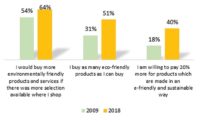Sustainable and responsible

It comes as no surprise that consumers have become more environmentally and sustainably conscious in recent years. But understanding the depth and breadth of these sustainable drivers is key to leveraging consumer convictions to increase brand trial and loyalty.
It is becoming increasingly important to demonstrate meaningful sustainability initiatives and offer product transparency to engage consumers. Shoppers look to companies and brands for meaningful environmental commitment that reflects their own personal values. Product packaging and waste in the environment are now forefront in many consumers’ minds, and how manufacturers respond to these concerns can affect the bottom line.
Consumers are trying to do their part to help combat environmental waste issues with every day actions. NMI’s 2020 Sustainability Consumer Trends Database found 79 percent of consumers save and reuse things whenever possible, 62 percent take their own bags to the grocery store, and 58 percent recycle plastic bags. That said, citizens are increasingly looking to the government and corporations to do their part and demonstrate accountability for environmental and sustainable practices. It is important for companies to not just be profitable, but to be mindful of their impact on the environment and society according to 78 percent of consumers—and that number jumps to 98 percent for sustainably focused consumers.
Demonstration of corporate eco-friendly initiatives differentiates products and helps shoppers feel better about using products that align with their personal environmental philosophies, a building block to establishing and maintaining brand loyalty. To stand out in a crowd in the current competitive landscape, a brand needs to deliver not only on product performance, but also on brand values that resonate with consumers. Half (50 percent) of the general population will buy products from companies they feel whose values are most like their own. Among sustainably minded consumers, this increases to three-fourths (74 percent). “Knowing that a company is mindful of its impact on the environment and society” makes consumers more likely to try a product, according to 59 percent of the general population.
Waste in the environment is of great concern among consumers. According to NMI’s 2020 Sustainability Consumer Trends Database, 82 percent of U.S consumers think we live in a wasteful society: 71 percent of consumers feel that the amount of waste on land, such as plastic, landfills, and litter, has gotten worse since the 1970s, and 77 percent feel the amount of waste in oceans, including plastics, trash, and oil, has worsened during this period. A sense of urgency is becoming increasingly apparent: 75 percent of consumers feel something needs to be done immediately about the amount of plastic accumulating in the oceans.
Packaging is one of the main culprits in consumers’ minds when it comes to waste issues and environmental protection. Seven out of ten U.S. adults think products are over-packaged, and it is concerning that a third (33 percent) will look for something else to buy when they see what they consider an over-packaged product. Package design engineers should take into consideration that well over half (57 percent) of the general population prefer to buy products from companies that use environmentally friendly packaging materials. As consumer commitment to sustainability increases, so does their desire for environmentally friendly packaging. In other words, the “greener” the consumer, the higher the preference for e-friendly packaging. Therefore, to keep target consumer respect, it is critical that sustainable product packaging follow suit—and the demand for environmentally friendly packaging increases depending on the type of core shopper. Percentage of category users indicating they prefer to buy products from manufacturers that use environmentally friendly packaging materials:
- General population—59 percent
- Organic food shoppers—80 percent
- Fair trade food shoppers—82 percent
Consumers want their food product packaging to be recyclable (37 percent), environmentally friendly (36 percent), minimal (35 percent), and compostable (30 percent).
In a world where information is a finger tap or mouse click away, consumers want transparency and proof of a company’s efforts toward sustainability. A mark or seal indicating a product is environmentally friendly increases purchase likelihood according to 40 percent of the general population, rising to 63 percent among sustainably minded consumers. Therefore, it’s critical that a product package display sustainable accountability.
In order to stay relevant to users, snack and bakery companies need to develop sustainably innovative products and packaging, communicate their environmental efforts with on-package messaging, and demonstrate their environmental convictions with global, national, or local action.
Looking for a reprint of this article?
From high-res PDFs to custom plaques, order your copy today!






